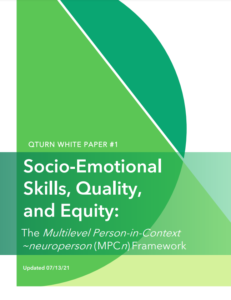Tag: Framework
July 13, 2021
We introduce a theoretical framework designed to describe the integrated set of mental and behavioral parts and processes (i.e., schemas, beliefs, and awareness) that are socio-emotional skills and that produce both basic and advanced forms of agency. With improved definitions and understanding of SEL skills, and the causes of SEL skill growth, we hope to improve reasoning about programs and policies for socio-emotional supports in any setting where children spend time.
